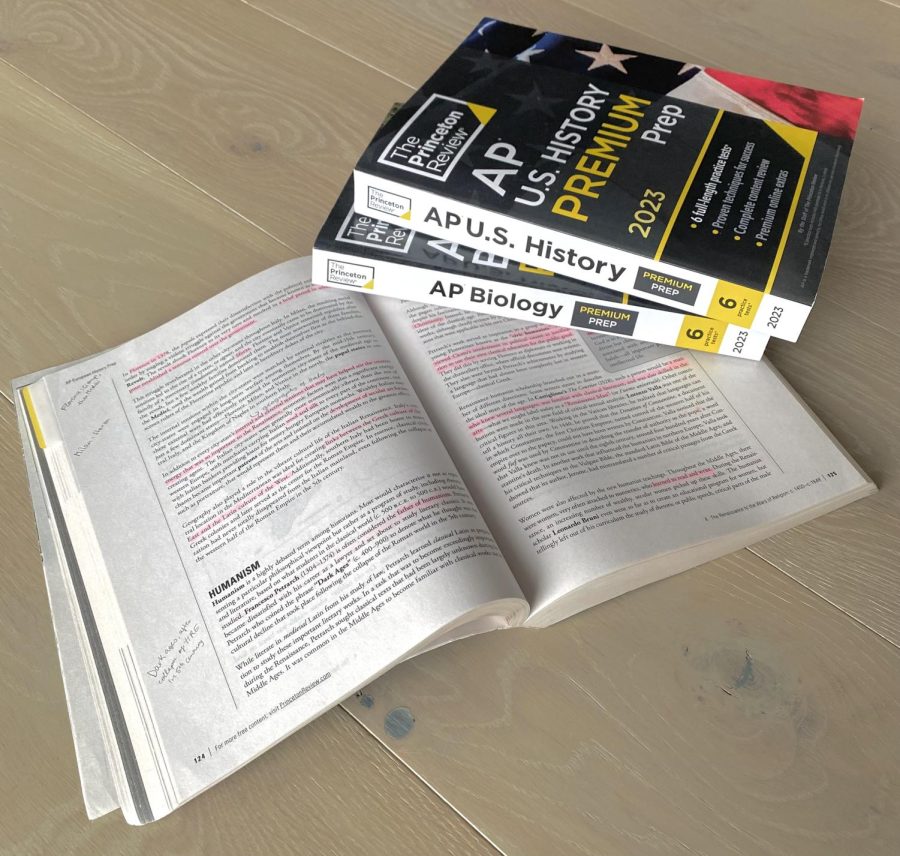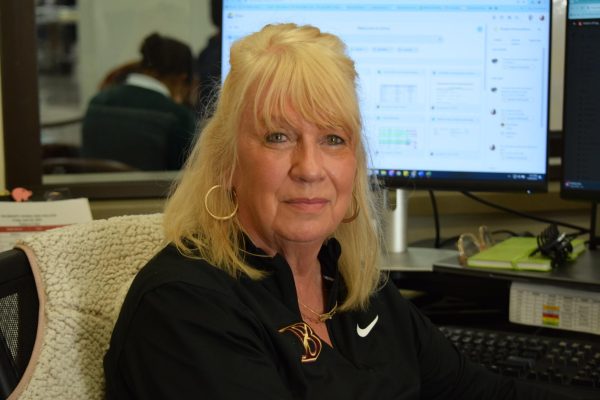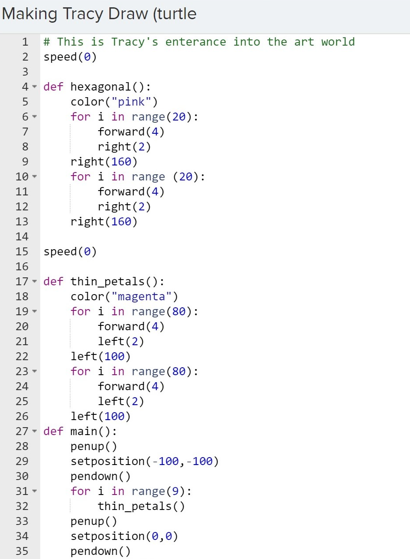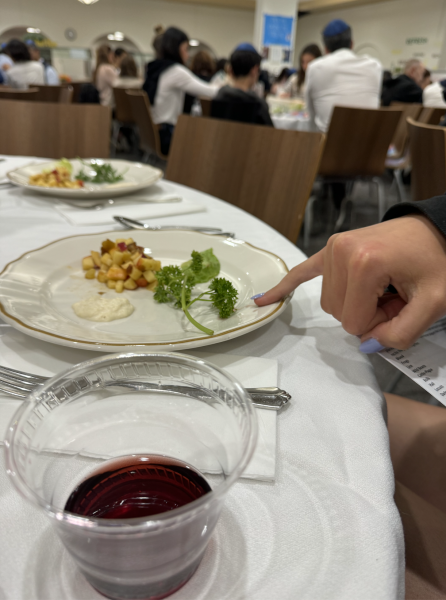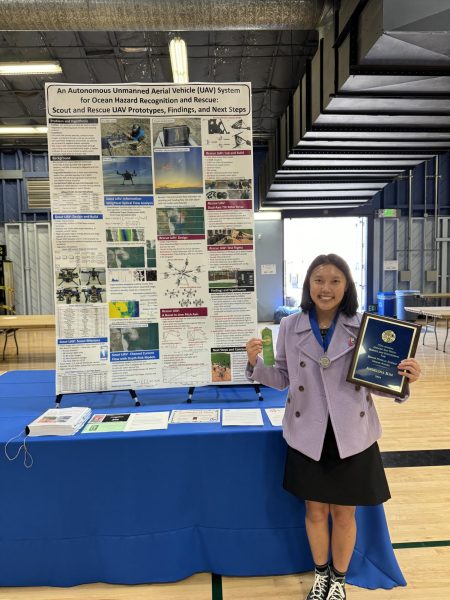APs: APprehension or APpreciated?
The benefits and drawbacks of taking Advanced Placement exams
Many students choose to “self-study” for AP exams using specified prep-books or other materials to supplement Honors classes’ lessons.
“Some teachers I know seem to feel relieved that the pressure of preparing students for their class’ AP test is gone. This pressure however, has fallen largely on us students,” said Maya Krolik (‘23).
Advanced Placement (AP) tests are three hour long multiple choice and free response exams that focus on certain subjects administered at schools in April or May. According to Director of College Counseling Ms.Wendy Chang, Bishop’s students take an average of five to six AP exams in their high school career—rendering several weeks of school time virtually dedicated to these tests. But are they even helpful to students? The School is still dedicating a lot of time and energy into the administration of AP exams, despite their official separation from the College Board curriculum at the beginning of the 2021-2022 school year.
Since the 2017-2018 school year, Bishop’s has been transitioning away from AP curriculum-driven classes to Honors courses. These courses cover similar material, but allow more flexibility for teachers and interesting topics for students. At the beginning of the 2021-2022 school year, an AP Update on Knights News announced a complete dissociation from the College Board curriculum, reasoning that, “AP courses that were replaced with Honors courses have improved the overall academic experience for students while giving our faculty more pedagogical freedom.”
This switch caused a lot of controversy. Some students preferred the convenience of AP curriculums over the flexibility of Honors classes. Maya Krolik (‘23) said, “I think that the AP classes themselves are more valued in the college application process. So it’s a little bit discouraging to know that you have to self-study now for all these.” However, Maya maintained that the Bishop’s Honors academic curriculums are still valuable. The issue is they are designed “for a different kind of open-ended learning that the College Board just happens to not recognize,” she said.
Ms. Chang added, “I think AP exams can serve great purposes, when they work, and I think they’re really useless… when they’re not necessary.” There have been instances where students get a year’s worth of college credit, saving them tens of thousands of dollars. However, many colleges no longer accept AP credits. Students often waste time and money studying for exams when they might not yield a desirable score.
One main reason students take AP exams is that passing scores can translate to college credit. According to the College Board, although it is not standardized across all colleges, most United States schools will translate an AP score of four to eight credit points that can go toward the 120 credit points needed for a Bachelor’s degree. Taking an AP exam for a world language college credit can also be valuable. Ms. Chang said, “There are colleges that have a language requirement, and a lot of the time students can waive that requirement” if they get a score of four or five.
Many Honors courses at Bishop’s have an accompanying AP exam. It is often hard to know if taking the exam is worth the extra studying. Honors Biology teacher Mr. Ben Duehr said, “I don’t know how many of those students will benefit from [the AP exam].” Some students may skip to a more advanced course or register for classes early, he said. Ms. Chang said, “It doesn’t hurt, right? Something that doesn’t hurt versus something that’s actually helping, those are two different things.” Good AP exam scores won’t negatively impact a college application, but the benefit they provide may not be significant.
Another negative factor of the exam is its cost. At Bishop’s each AP exam costs 110 dollars with an additional 40 dollars for late registration.
Students at Bishop’s still take AP exams despite the School’s course curriculums being independent from the College Board’s AP syllabuses. The general consensus from the interviewed Upper School students is that if an AP exam was offered for an Honors class, the student would take the exam. Nancy Waldman (‘23) said, “For certain subjects, [the dissociation of the School from AP curriculums] hasn’t really affected my priorities because I still take them, no matter if it’s technically an Honors course.”
Bishop’s students often assume that the more AP exams they take, the more appealing their application will look to colleges. Ms. Chang explained that this is not necessarily the case.
French Four Honors teacher Mme. Rikke Sommer corroborated, “I taught for a long time at the University of California San Diego and we did look at the scores in French. A score of four would get you into the second quarter of the second year directly and a five would get you into the last quarter of the second year.” In addition, studying for the AP language exams increases students’ proficiency in the language. Mme. Sommer said, “I can say from over 20 years of experience out there that folks who had done the AP preparation and taken the class were much better prepared and had much better skills than the students who didn’t.”
The Bishop’s English department was the first to detach itself from the College Board AP curriculum in the 2017-2018 school year. English Department Chair Dr. Anna Clark said that AP English exams are “not good indicators of creativity, style, voice, [or] original thought,” all components valued in Bishop’s English classes. She continued, and said, “I don’t think spending [time] on an AP English test makes sense.”
Explaining another reason for the transition away from AP-centered courses, Honors United States History teacher Mr. Matthew Valji said that the School’s curriculums have a reputation for academic rigor and excellence. On the other hand, the “AP system is one that is based on a curriculum developed by a private corporation, the College Board. And we don’t necessarily align with the College Board in every area.”
Most Honors classes offered at Bishop’s do prepare students for the exam. Calculus AB teacher Ms. Dolores Williamson said, “You guys should just see what happens [when you take the Calculus AB AP]: you’re going to be prepared.” Mr. Duehr added that he prepares everyone for the Biology AP exam. He said, “The class is on a trajectory to prepare students for it,” even after the renaming of the course to “Honors.”
However, as Honors Biology teacher Dr. Lani Keller said, “What I tell my students is you should not take it for fun because it’s not fun. It is a three-hour test. It’s painful.” Dr. Keller believes that students should not take the AP Biology exam unless they have a “good reason” to take it, whatever that may be. “A lot of students,” she said, “know that some of the colleges that they’re going to apply to will take credit for [AP scores]…if you have a good reason to take it, you should totally do it.”
Dr. Keller also explained that some courses do not require that much additional so-called self-studying because of the overlap of course material. In the case of Honors Biology, she said, “[Teachers] do not give [students] time to study [for the AP], but if they’re studying for our cumulative exam, that is studying for the AP exam.” Adding to this, Mr. Duehr said, “Our test is in late April so that students who are going to take it are already ready before all the other AP tests.”
Ms. Williamson also goes over the format of the AP test in her classes. She explained, “I do think that you have to prepare them for it because there are [test-taking] tricks to the AP test. So if I didn’t do any review of what the AP test looks like, it would be a disservice.”
Of the seven interviewed teachers from all academic departments, the majority expressed their preference for a curriculum that is not specified to the AP exam. Mr. Duehr said, “We like the flexibility that not being an AP class allows us to go off on different tangents if we want to—and we do.”
This freedom can also benefit students. Mme. Sommer said, “at least from my perspective, it’s fun: more fun what we read, what we write, what we listen to, what we watch.” Dr. Keller said, “When students are really jazzed about a topic, we can delve into that a little bit deeper.”
Contrasting the majority preference of teachers who teach Honors courses without the restrictive AP curriculum, Ms. Williamson said “I think I’m in the minority of this and I’ll probably get booed by a bunch of teachers here, but I wish that all my students would take it because I think it would just make it more fun. Like, we’re all in this team, we’re all in this together.”
In addition, even after the renaming of AP courses to Honors classes, some departments’ curriculums have not changed that much. In the case of French, Mme Sommer said, “It’s valuable work across the board anyway because that’s what you want to learn regardless of the exam. So, you know, I think the exam is not a bad thing.” Mme Sommer still prepares her students for the essay and cultural comparison of the French AP exam. She said, “that’s still a useful thing to be able to do in French… it’s not lost or wasted time.”
The School still devotes a lot of time to AP exams despite being detached from their program. Mr. Duehr said, “We clearly facilitate and support AP tests on campus, and for certain courses and grade levels, ‘normal’ academics are quite altered to allow for students to sit for these tests. There is a discussion of the mixed messages we send when we dedicate so much time to these tests when we’re not actually teaching AP classes.” Mr. Valji said, “My sense is that we are supportive of students who choose to take AP tests, but that we are not binding our curriculum to the College Board in the way that we used to.”
The pros and cons of AP exams mean that the decision of whether or not to take an AP exam becomes at once more complicated and less significant: does it make sense for your goals in high school and college or will you embrace the dissociation between the School and the AP curriculum and opt-out?

Emeraude is a senior and this is her second year on The Tower. This year, she is a Content Editor and she loves covering campus events and trends. Along...


